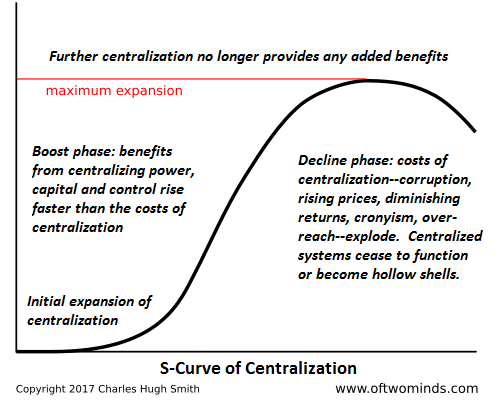When
something no longer works, it goes away: it costs more to maintain than its
output is worth.
The
fragmentation of political consensus (i.e. the consent of the citizenry) is
presented by the Powers That Be and their media servants as being a disaster. The
implicit fear is real enough: how can we rule the entire
nation-empire if it fragments?
As I
noted the other day, fragmentation terrifies the Establishment of
racketeers and insiders, for when the centrally-enforced
rentier skims and scams collapse, those who own and control the rentier skims,
scams and rackets will lose the source of their wealth and power.
To
understand why fragmentation is the solution rather than the problem, we have
to look at how power is leveraged in centralized government. Let's
take the recent increase in a common pinworm treatment from $3 to $600: Pinworm
prescription jumps from $3 to up to $600 a pill (via J.F.).
In a
top-down, centralized hierarchy of political power (i.e. the central state),
the pharmaceutical company only needs to lobby a few authorities in the central
state to impose its rentier skim/scam on the entire nation.
Lobbying/bribing
a relative handful of federal officials and elected representatives is
remarkably inexpensive: a financier or corporation only needs to focus on these
few key players, and smoothing the PR pathway via a highly concentrated
corporate media.
A
mere $5 million spent in the right places guarantees $100 million in future
profits-- profits earned not from open competition in a transparent market, but
profits plundered as rentier skims: the
product didn't get any better or effective when the price leaped from $3 to
$600, and competition was squelched by regulatory capture and high
barriers to entry.
Now
imagine if the pharmaceutical company had to lobby/bribe officials in each of
America's 3,142 counties to impose its rapacious rentier skim on the populace
of each county. The lobbying/bribing effort will be orders of magnitude
more costly and complex, and the national corporate media is less effective at
the local level, where community groups and local media have some influence.
If we
look at the source of the 2008 Global Financial Meltdown, we find that the
centralization of capital and power were the primary enablers of the meltdown. If
the financial system were composed of 1,200 local banks, each of which had to
comply with local and state regulations instead of five behemoth banks that had
the capital and klout to buy Washington D.C.'s approval of their leverage and
shady dealings, some hundreds of the smaller banks might have failed--but the
system would have survived.
Those
banks that played fast and loose with derivatives and subprime mortgages would
have reaped what they had sown and been liquidated. Investors in those banks'
bonds and stocks would have been wiped out. Losses would have been taken by
those who had taken the risks, bad debts would have been written off and
lessons would have been learned.
Instead,
the five big banks and a handful of other monstrous financial entities were
able to cry, "If you don't save us, we'll take the entire system down with
us!" A system that prohibited the concentration of centralized
capital and power would never have been in a position to be blackmailed by the
Too Big To Fail predatory parasites.
We live
in an incredibly diverse nation and world. Fragmentation serves this world
better than centralized power, which as I explain in my
short books Inequality
and the Collapse of Privilege and Why
Our Status Quo Failed and Is Beyond Reform, is breeds
corruption, self-serving bureaucracies, insider rackets, cronyism and rentier
skims as the only possible output of the system.
If we
want a resilient, flexible, low-cost system, we must replace the centralized
system of enforced consent and artificial consensus with
a fragmented, transparent one of smaller scaled, competing organizations of
governance, capital and enterprise.
The
intrinsic limits of a corrupt, inefficient and rigged-to-serve-the-few-at
-the-expense- of-the-many centralized pyramid of power and wealth is why
centralization is the problem rather than the solution:

Transparent
fragmentation is the solution. Only those who will lose their share of the
rentier skims, scams and rackets are afraid of history's trajectory away from
centralization. When something no longer works, it goes away: it costs
more to maintain than its output is worth.
As
its defenders tax the system to protect what no longer works (except for them,
of course), the slide to oblivion accelerates as the system breaks down under
the collective weight of all the skims, scams and rackets benefiting the few at
the expense of the many.
If you found value in this content, please join me in seeking solutions by becoming a $1/month patron of my work via patreon.com.
If you found value in this content, please join me in seeking solutions by becoming a $1/month patron of my work via patreon.com.
Check out
both of my new books, Inequality and the Collapse of
Privilege($3.95 Kindle, $8.95 print) and Why Our Status Quo Failed and Is
Beyond Reform($3.95 Kindle, $8.95 print). For more, please visit
the OTM essentials website.